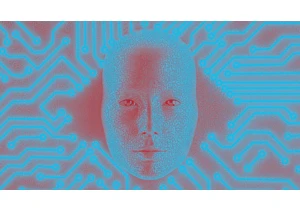The Brutalist, a three-and-a-half-hour awards favorite, is a film about human creativity. Ironically, its biggest scandal surrounds artificial intelligence.
Brady Corbet’s epic follows Hungarian Jew László Tóth, played by Adrien Brody, as he flees the Nazis and picks up his architecture practice in the United States. Eventually he manages to bring his wife, Erzsébet, played by Felicity Jones, to join him. Both characters frequently speak in Hungarian throughout the film. That dialogue, it turns out, may have been supplemented by an AI speech tool.
In an interview with RedShark News, The Brutalist’s editor, Dávid Jancsó, revealed that the film had employed Respeecher, an AI voice editing tool. Cinephiles online blew up, with some even planning to boycott the film. Corbet is now on an oddball apology tour, clarifying just how AI was used by the production. But he shouldn’t have to be. The mass freakout fundamentally misunderstands what film editing actually looks like, and how films stay on budget.
What is “artificial” film editing?
Jancsó is a native Hungarian speaker; he knows how difficult the language is to replicate. That’s true even for Brody, whose mother is in fact a Hungarian refugee. While producers coached Brody and Jones intensively, they used the AI tool Respeecher to insert some of Jancsó’s own pronunciations into the dialogue.
In the RedShark interview, Jancsó acknowledges how commonplace these types of audio edits are. “You can do this in [Avid] Pro Tools yourself, but we had so much dialogue in Hungarian that we really needed to speed up the process otherwise we’d still be in post,” he said.
That’s what the naysayers misunderstand: Film editing is fundamentally artificial. For years, filmmakers have been manipulating dialogue through creative splicing and re-creation. Editing tools have gotten increasingly more sophisticated. Now they’re just labeled with “AI.”
Jancsó also said in the interview that generative AI helped create the architectural images featured in the final sequence of the film. Corbet later clarified: “Judy Becker and her team did not use AI to create or render any of the buildings. All images were hand-drawn by artists.”
Remember that The Brutalist, a sprawling cinematic epic of proportions rarely produced in the current film market, was made for a mere $10 million. For reference, the film in which Brody had his breakout, Academy Award-winning role, The Pianist, cost $25 million more—and that was 22 years ago. Hand-drawing all images on The Brutalist’s budget, even if modulated or inspired by AI, is impressive.
But cinephiles online couldn’t take it. One viral X post says Jancsó is just looking for an excuse to “avoid paying visual artists” and suggests it amounts to the erasure of “a fundamental aspect of . . . acting.” Many have said it’s hypocritical to use AI in a film about the humanity of art; others say Brody should be disqualified from Oscar contention.
Who’s afraid of the big bad AI?
The film industry has a good reason to be fearful of AI. Feature films are being created out of thin air, with no craft behind them. Their quality is still low, but it’s a daunting sign of what’s to come. Some Hollywood studios began collecting body scans of actors, worrying many that “extra” work would evaporate. Contracts reached in the 2023 Screen Actors Guild-American Federation of Television and Radio Artists and Writers Guild of America strikes both included AI clauses.
But this fear of human replacement has turned AI into a technological boogeyman. The words artificial intelligence are enough of a dog whistle to stir outrage. But let’s face it: Hollywood can and will adapt to AI, and there may even be some benefits. These critics are merely burying their heads in the sand instead of properly appraising which applications are helpful and which aren’t.
The Brutalist controversy will eventually pass, though the commotion could be a blow to the film’s Oscar chances. What will linger is this culture of AI hysteria.
Chcete-li přidat komentář, přihlaste se
Ostatní příspěvky v této skupině


Anthropic released on Monday its Claude 3.7 Sonnet model, which it says returns results faster and can show the user the “chain of thought” it follows to reach an answer. This latest model also po

This morning, Apple announced its largest spend commitment to da


In 2024, Amazon introduced its AI-powered HR ass

Lore isn’t just for games like The Elder Scrolls or films like The Lord of the Rings—online, it has evolved into something entirely new.
The Old English word made the s

Ben Sweeny, the salesman-turned-comedian behind that online persona Corporate Sween, says that bosses should waterboard their employees.
“Some companies drown their employees with
